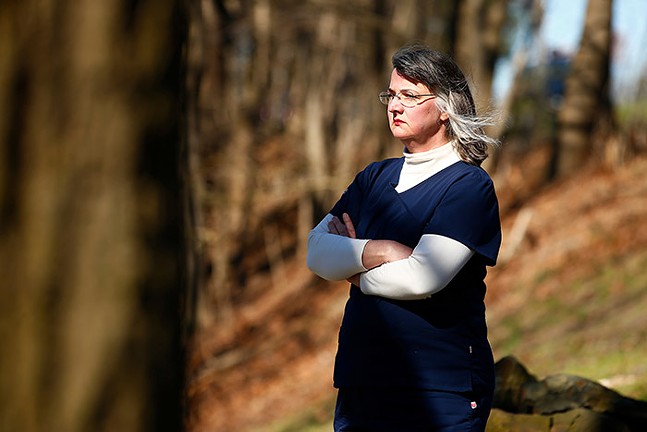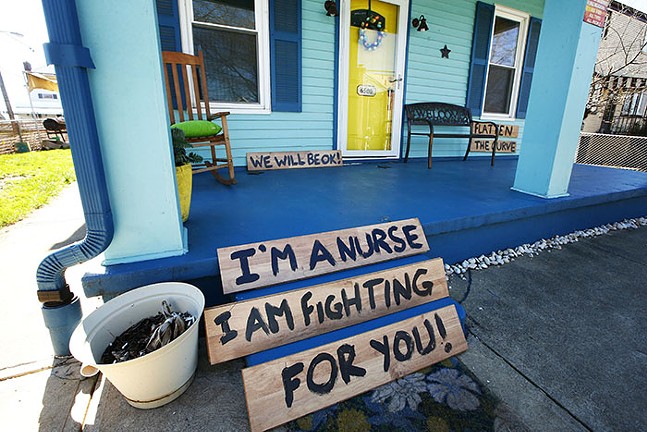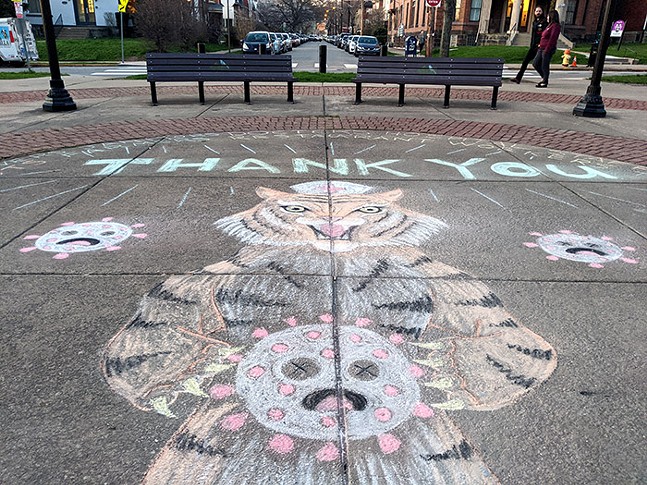
CP photo: Jared Wickerham
Michelle Boyle, an RN-BSN at Allegheny General Hospital, poses for a portrait in Highland Park.
But in the grand scheme of things, both in the context of the coronavirus and in general, nurses and health-care workers like orderlies, food preparers, technicians, and home aids are struggling. Workers at nursing homes and personal-care aides across Pennsylvania and the U.S. are lacking Personal Protective Equipment (PPE) to keep them safe from possible infections while coronavirus spreads. Despite being one of the largest job sectors in Pennsylvania, nurses still struggle to get their legislative priorities through Harrisburg or to receive the widespread backing that normally follows workers of some of the biggest and richest enterprises in the state.
Francis Adams, a personal-care aide in Washington, Pa., says that coronavirus has its challenges, but it isn’t unique in that he and other home health-care workers always have to be there for clients, no matter what.
“Rain, snow, disasters — a lot of the time in rural areas, they have no one,” says Adams.
Adams appreciates the rhetorical support from citizens, politicians, and others, but laments the lack of attention and true political action that might lead to workers getting more protection and expanded workers’ rights during the pandemic. Adams says his company is making improvements and working with his union, SEIU Healthcare, to bring in necessary PPE like masks and face shields. He says these are absolutely necessary for personal care aides because many of them can't practice social distancing while caring for their patients. Adams’ patient, for example, is blind and needs Adams to make physical contact with him.
“Part of the problem with our government and representatives is they don’t know we exist,” says Adams. “When we talked to [some politicians], a lot of them didn’t even know this was a job. Or what we do. And like I said, we have to be there.”
Labor unions are increasing their rally cries for more support, but they have a lot of ground to make up. Coronavirus could be the catalyst for a bigger and more successful push, elevating health-care workers into the upper echelon of political power. But there are many obstacles to overcome, and with a pandemic breathing down their necks, they might not have time.
Health-care companies like University of Pittsburgh Medical Center (UPMC), Genesis Healthcare, and Highmark are behemoths that bring in billions of dollars in revenue annually. Hospital employees, nurses, and personal-care aides tally more than 94,000 in the Pittsburgh area alone. There are as many registered nurses and personal-care aides in Pennsylvania (about 270,000) as there are gas and mining workers nationwide.

C
Signs on a front porch in Stanton Heights read, "Flatten the curve" and "I'm a nurse. I am fighting for you! We will be OK!"
Last week, President Trump hinted, without evidence, that nurses and health-care workers in New York were stealing PPE like masks, and that shortage claims were being inflated.
On March 30, nurses, health-care workers, labor leaders, and U.S. Sen. Bob Casey (D-Scranton) held a conference calling for more support to get health-care workers the necessary PPE and additional labor rights during the pandemic.
Casey said Trump should act more like the mayors and governors that are addressing the pandemic, instead of “just making things up.” He implored the Trump administration to enact the Defense Production Act to force manufacturers to make more PPE.
“We are the most powerful country in the world,” said Casey at the conference. “We can provide enough PPE, and that requires a full commitment from the federal government. If that is what is needed, then the president should be demanding that. The way that [health-care workers] should be treated should be the same as soldiers in a war.”
Crystal Patterson, a home health-care attendant from Washington, Pa., spoke during the conference call and expressed concern that she and her co-workers won’t have the proper PPE for household visits and transport. Patterson takes the bus to get to work and worries every day she is catching COVID-19 and bringing it home to her son, who has health conditions which make him vulnerable to the disease.
“If regular citizens are going the extra length to protect the community, so should the government,” said Patterson, who also said Trump should do more to ensure workers have access to PPE.
And she said she can’t really choose not to work because her company only provides her normal allocated sick days as time off. She said she could quit, but there is “no guarantee I would get my job back” after the pandemic ends.
Even Casey acknowledged the steep climb health-care workers face to get their voices heard and their demands addressed promptly.
“None of us have done enough, and both parties have to do a lot more,” said Casey when asked why the needs of health-care workers haven't already been met. “In terms of the values of the importance of these workers, we have a long way to go.”
Take the political power of the fossil-fuel industry as an example. Petrochemical industry companies and their related unions backed a bill that would have provided about $1 billion in tax credits to petrochemical companies that moved into Pennsylvania. The bill, HB 1100, passed through the legislature in less than a year, and garnered widespread support from Republicans and Democrats, before being vetoed by Gov. Tom Wolf. Republicans then criticized Wolf for vetoing the bill and tried to blame him for the state’s large unemployment figures related to coronavirus, despite the fact that if HB 1100 passed, it would have potentially encouraged petrochemical companies to bring jobs to the state over the course of 50 years, not the immediate future.“If regular citizens are going the extra length to protect the community, so should the government."
tweet this
Meanwhile, the Safe Staffing bill being advocated by nurses for lower staff-patient ratios was introduced in March 2019, and it has failed to even receive a vote in committee. Nurses for PA, a lobbying group, has been supporting this bill as a means to provide safer working conditions for nurses, who sometimes have up to 10 patients to care for at a time.
“When the patients are getting sicker and require more care, I can’t provide more care,” said Homestead nurse Joanna Haneman in May 2019. “Every patient is in their worst situation; everyone requires humane and compassionate care.”
The Safe Staffing bill has been advocated in Harrisburg for nearly six years and has never received a floor vote.
The Pennsylvania Department of Labor and Industry estimates there are between 20,000 to 50,000 jobs supported by the state’s fracking industry, which would supply any natural gas that petrochemical plants rely on. According to the Bureau of Labor Statistics, Pennsylvania is home to more than 465,000 jobs in the nursing, personal care aide, and health-care support industries combined.
But as calls for PPE and other labor protections for health-care workers are struggling to break through, trades union workers were having a much easier time to see their coronavirus protection demands met.
Workers at the Shell cracker plant, an under-construction petrochemical facility in Beaver County, were able to pressure Shell to shut down construction a few days before the statewide business closures went into effect and before any worker on the site tested positive for coronavirus.
By comparison, it took 38 positive coronavirus cases, three deaths, and six employees testing positive at Brighton Rehabilitation and Wellness Center nursing home in Beaver County before owners agreed to a deal with SEIU Healthcare to provide all 300 workers there hazard pay, PPE, and no threats of retaliation for speaking out publicly.
Lara Putnam is a labor historian at the University of Pittsburgh. She acknowledges the powerful political role held in Pennsylvania by fossil-fuel workers compared to health-care workers.
“The construction of the cracker plant stopped because of workers’ complaints and support from local politicians, and it happened much faster than it would have if they didn't have local labor power,” said Putnam.
But she notes it took decades for fossil-fuel related workers like those to build enough power to influence politicians.
“One hundred years ago, you would not say miners and fossil-fuel workers had control over the legislators,” said Putman. She adds that constant labor fights and victories for these workers led to a sea change, which then created a positive cycle of economic and political victories for fossil-fuel workers in Pennsylvania.
“They got a seat at the table, and then better rights, and then better economic conditions, and then more sway at national politics,” says Putnam.
She says nurses and health-care workers could start seeing similar sway, but more union organizing and policy victories will need to happen to start that positive reinforcement cycle that fossil-fuel workers have created.
Michelle Boyle is a nurse at Allegheny General Hospital (AGH) and previously ran for state Senate as a Democrat. She says the atmosphere at AGH is incredibly tense, as the hospital is still waiting for the coronavirus surge to hit.
Boyle says the PPE situation at AGH is adequate, but she has heard from other hospitals that no longer have any gloves. She says these shortages are a failing of the country’s health-care system. “We don’t ask firefighters to go into the fire without protective equipment, but we are asked to do what we can,” says Boyle. “They call us essential because calling us sacrificial is too honest.”“They call us essential because calling us sacrificial is too honest.”
tweet this
She says AGH nurses and staff being part of a union have helped her hospital workers get what they need, like the N-95 masks she says are necessary in a hospital setting. She says workers and administrators are having regular communication through emails and phone calls.
But she recognizes that relationship is not the norm at all hospitals, and things haven't always run smoothly between hospital owners and workers during COVID-19. The hospitals can at times undermine the safety needs of nurses and workers.
Early on in the pandemic, on March 13, the American Hospital Association urged House Democrats to withdraw workplace safety standards that would require N-95 masks for workers from the second coronavirus stimulus bill. Boyle says the move by AHA, an organization that lobbies on behalf of 5,000 hospitals and health-care groups nationwide, pitted hospital owners against nurses. “They are watering down the language for PPE for people in hospitals,” says Boyle.
AHA said that it was just following guidelines from the Centers of Disease Control and Prevention, who relaxed its own guidelines in the face of a N-95 mask shortage.
Boyle has also heard other Pittsburgh area workers, particularly those lacking a union, are not able to talk about what they need.
UPMC, the state’s biggest hospital chain and one of its biggest employers, has been notoriously anti-union for years. Efforts to unionize workers at UPMC have stalled for years, and political support has been relatively meek, with only a handful of state Democrats speaking out in support of those efforts. And according to PublicSource, a March 11 memo from UPMC emphasized its policy prohibiting rank-and-file employees from talking to reporters.
UPMC issued a statement to PublicSource on March 23 saying hospital leadership has "had extensive communication with employees to share what we know about COVID-19 and explain UPMC's preparedness,” including in-person and virtual meetings with UPMC experts, and has created an email address where employees can ask non-urgent questions.
Putnam says anti-union large hospital chains are making it harder for nurses and healthcare workers to gain political sway, and UPMC is “Exhibit A in an employer pulling out the stops to prevent union organizing.”
“Public-health facilities and hospitals need those voices elevated,” says Putnam. “But when you have been trying to suppress those voices for 10 years, then you are behind.”
She says “pink-collar” professions like nursing and personal-care jobs that are traditionally held by women have struggled to organize unions and get politicians to notice their economic importance. Putnam says the nursing homes in more rural areas have even more difficulty gaining union support and getting attention from politicians.
Though Democrats have supplied most of the support for health-workers in recent history, Putnam says that plenty of health-care workers vote Republican, and there is about a 50-50 split of what party these workers typically support.
But with Republicans like Trump openly criticizing health-care workers and Pennsylvania Republicans not supporting their legislative priorities like safe nursing staffing levels or the right to unionize, Putnam says “Republicans have a lot of ground they can lose among health-care workers.”
The data supports this notion. Polling from Working America, an affiliate of the AFL-CIO labor union conglomerate, shows the coronavirus pandemic is increasing the prioritization of health care as an issue, and voters concerned about health care as an issue have spiked 4 percentage points since February. Data shows voters that prioritize health care support Democrats by a 22 point margin.“There are nurse practitioners today in Pennsylvania who are unable to work due to outdated regulations.”
tweet this
And more and more Democrats appear to be joining the health-care workers’ efforts. On April 6, 37 mayors from across Pennsylvania, mostly Democrats, joined a petition calling on the federal government to use its emergency powers to ramp up production of ventilators and PPEs.
But nurses organizations are starting to up the ante and are increasing calls for more support in their coronavirus efforts. On April 3, nurse practitioners in Pennsylvania called on Gov. Wolf to take executive action so that nurse practitioners can practice health care without signed agreements with physicians. Advocates say this will help health-care providers react more quickly to patients' needs during the pandemic.
“We have one mission: to care for patients during this COVID-19 pandemic. It is a time for all-hands-on-deck,” said Pennsylvania Coalition of Nurse Practitioners president Dr. Adele Caruso. “Yet there are nurse practitioners today in Pennsylvania who are unable to work due to outdated regulations.”
PA Healthcare Association president Zachary Shamberg said during a March 30 press call that it has been a challenge since he started working with health-care workers to get people to recognize their importance.
But he said coronavirus might just be the thing that finally gets Pennsylvania and the nation to realize just how important nurses and health-care workers are, and for those workers to get the political power they deserve.
“Sometimes it takes a crisis like this to admire those working on the frontlines,” said Shamberg.


